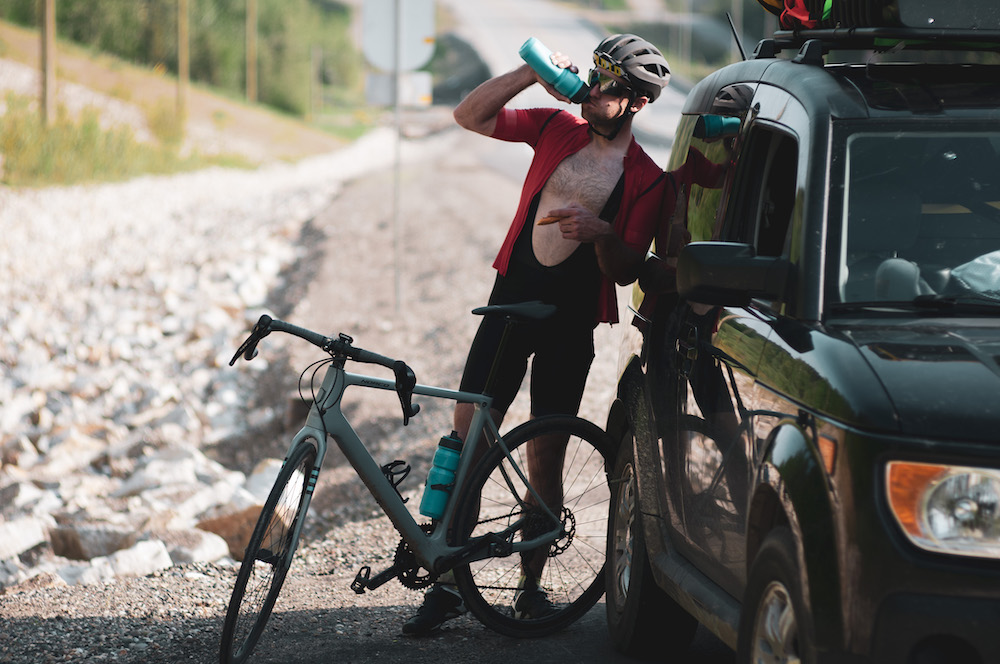Hey guys, welcome back for today’s topic, hydration! It may seem simple on the outside but there’s a little more to proper hydration than you’d expect. In this blog we’re going to talk about water consumption for the average person and how it differs for an athlete. We also take a look at electrolytes and how athletes should replenish them. Hope you enjoy!
BASIC TIPS TO STAY HYDRATED ON YOUR RIDE
- Start your morning off by drinking a glass of water.
- I know it’s hard, but try holding off on drinking coffee until after your morning workout.
- Sip water throughout your bike ride and try adding an organic fruit juice to your water bottle as a source of carbs.
- Don’t forget to replenish your electrolytes post-ride!
Hydration for the AVERAGE JOE
There are many factors that influence the amount of water that we need on a daily basis. Our bodies expel water through the skin, lungs, bowels, and urine. The average person needs about 2.8 liters of water daily, this equates to about 11 cups. However, not all of our water intake needs to be from liquids, surprisingly, about half of our daily requirements come from our food. More water is retained from a diet rich in fruits and vegetables than a diet rich in fats and meats. In general, it’s recommended that we drink a total of 5.5-7.5 cups of water at various intervals throughout the day, starting with 1-2 cups first thing in the morning, and avoiding water consumption during meals as it can disrupt digestion.
Hydration for an ATHLETE
Long distance biking increases water requirements, as large amounts of water are lost when we sweat and breathe heavily. These fluids need to be replenished therefore we require more water than the average person. In theory, we want to replace what we’ve lost, so listen to your body and drink when you’re thirsty. It knows better than you do! Have you ever been on a long ride and one of your legs starts to cramp up? Do you feel more fatigued than usual on the same loop you’ve done 100 times? These are two of the many symptoms of dehydration. Water is required for critical functions within the body, it supports the process of sweating – which eliminates toxins through the skin. It also improves our blood circulation – which carries oxygen and nutrients throughout our body to nourish our tissues and cells. A dehydrated athlete is more susceptible to: fatigue, overall decreased performance, and muscle injuries.
ELECTROLYTES
Water isn’t the only thing that needs to be replenished during exercise. We also need to replace the minerals that are used up by our bodies or lost through sweat. Electrolyte is a general term referring to minerals with an electrical charge. For athletes, the most important electrolytes to replenish are: potassium (K+), magnesium (Mg2+), sodium (Na+), and calcium (Ca2+) – which are essential to support muscle function and nerve conduction.
Electrolytes often come in the form of “sports drinks”. Although convenient, these drinks often contain chemicals and large amounts of artificial sugars. Don’t forget, not all sugars are created equal, you’re better off with naturally occurring sugars like those found in 100% fruit juices than the processed ones found in sports drinks. Next time you go out for a ride, try adding an organic fruit juice (free from added sugar) to your water bottle for a 1:4 ratio of juice to water. For example, adding 100% pomegranate juice to your water will provide you with a source of carbs and potassium, both of which improve endurance.
After finishing your ride, consume a high quality electrolyte supplement (containing K+, Mg2+, Na+, and Ca2+) to replenish what you’ve lost. Taking electrolytes in supplement form is a great choice because they’re most often free from chemicals, preservatives and artificial sugars. Replacing those lost minerals will provide additional cellular support, reduce muscle spasms, and have you ready for your next ride in no time!
Try not to over think it, just eat a diet rich in fruits and vegetables and drink when you’re thirsty. Start your morning off with a glass of water, and continue to drink it sporadically throughout the day. Don’t forget, incorporating good-quality electrolytes into your exercise routine will improve endurance and speed-up your recovery! Thanks for tuning in and be sure to check back next week when I post a recipe for my favourite electrolyte drink. Try it out and let me know if you notice a difference in your performance!

